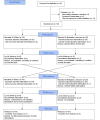Virtual Reality Relaxation for Patients With a Psychiatric Disorder: Crossover Randomized Controlled Trial
- PMID: 33448933
- PMCID: PMC7846446
- DOI: 10.2196/17233
Virtual Reality Relaxation for Patients With a Psychiatric Disorder: Crossover Randomized Controlled Trial
Abstract
Background: Virtual reality (VR) relaxation is a promising mental health intervention that may be an effective tool for stress reduction but has hardly been tested in clinical trials with psychiatric patients. We developed an easy-to-use VR self-management relaxation tool (VRelax) with immersive 360° nature videos and interactive animated elements.
Objective: To investigate the immediate effects of VR relaxation on negative and positive affective states and short-term effects on perceived stress and symptoms in patients with a psychiatric disorder, compared to standard relaxation exercises.
Methods: A randomized crossover trial was conducted in 50 patients receiving ambulatory treatment for anxiety, psychotic, depressive, or bipolar disorder. Participants were randomly assigned to start with VRelax or standard relaxation and used both interventions for 10 days at home. They completed 8 visual analog scales of momentary negative and positive affective states before and after each session. Global perceived stress and psychiatric symptoms were measured before and after both intervention periods. Treatment effects were analyzed with multilevel mixed model regression analyses and 2-way analysis of variance.
Results: Both VRelax and standard relaxation exercises led to a statistically significant immediate improvement of all negative and positive affective states. Compared to standard relaxation, VRelax resulted in a significantly greater reduction of total negative affective state (change 16.2% versus 21.2%; t1684=-2.02, 95% CI -18.70 to -0.28; P=.04). Specifically, VRelax had a stronger beneficial effect on momentary anxiety (t1684=-3.24, 95% CI -6.86 to -1.69), sadness (t1684=-2.32, 95% CI -6.51 to -0.55), and cheerfulness (t1684=2.35, 95% CI 0.51 to 5.75). There were no significant differences between short-term effects of the two treatments on global perceived stress and symptoms.
Conclusions: If the results of this trial are replicated and extended, VRelax may provide a much-needed, effective, easy-to-use self-management relaxation intervention to enhance psychiatric treatments.
Trial registration: Netherlands Trial Register NTR7294; https://www.trialregister.nl/trial/7096.
Keywords: anxiety; depression; negative affect; positive affect; randomized controlled trial; relaxation; stress; virtual reality.
©Wim Veling, Bart Lestestuiver, Marieke Jongma, H J Rogier Hoenders, Catheleine van Driel. Originally published in the Journal of Medical Internet Research (http://www.jmir.org), 15.01.2021.
Conflict of interest statement
Conflicts of Interest: WV is cofounder and chief scientific officer of VRelax BV, the company that has developed the VR in collaboration with UMCG, and holds shares in VRelax BV. MJ is cofounder of VRelax BV and holds shares. The remaining authors have no conflicts to declare.
Figures
References
-
- Selye H. The stress of life. New York: McGraw-Hill; 1956.
-
- Schneiderman N, Ironson G, Siegel SD. Stress and health: psychological, behavioral, and biological determinants. Annu Rev Clin Psychol. 2005;1:607–28. doi: 10.1146/annurev.clinpsy.1.102803.144141. http://europepmc.org/abstract/MED/17716101 - DOI - PMC - PubMed
-
- Manzoni GM, Pagnini F, Castelnuovo G, Molinari E. Relaxation training for anxiety: a ten-years systematic review with meta-analysis. BMC Psychiatry. 2008;8:41. doi: 10.1186/1471-244X-8-41. http://www.biomedcentral.com/1471-244X/8/41 - DOI - PMC - PubMed
Publication types
MeSH terms
Associated data
LinkOut - more resources
Full Text Sources
Other Literature Sources
Medical




